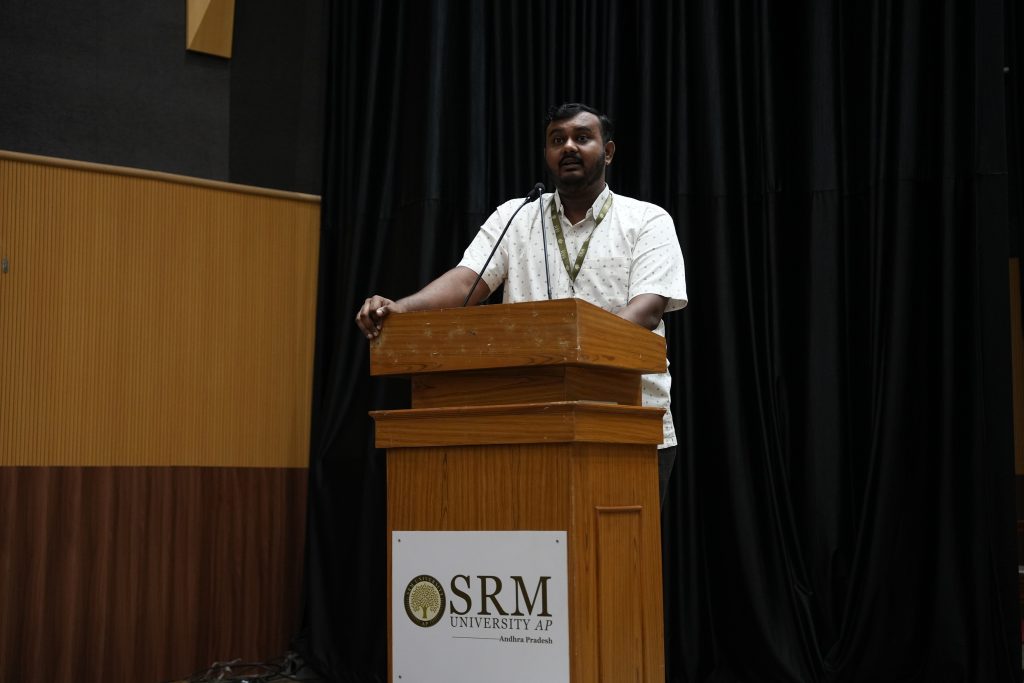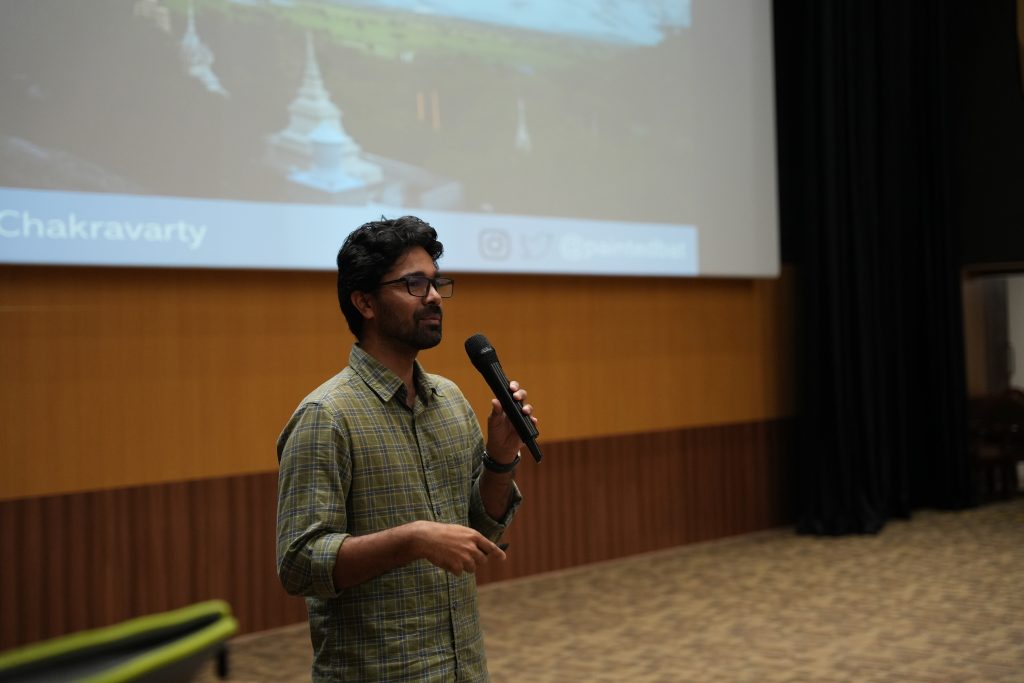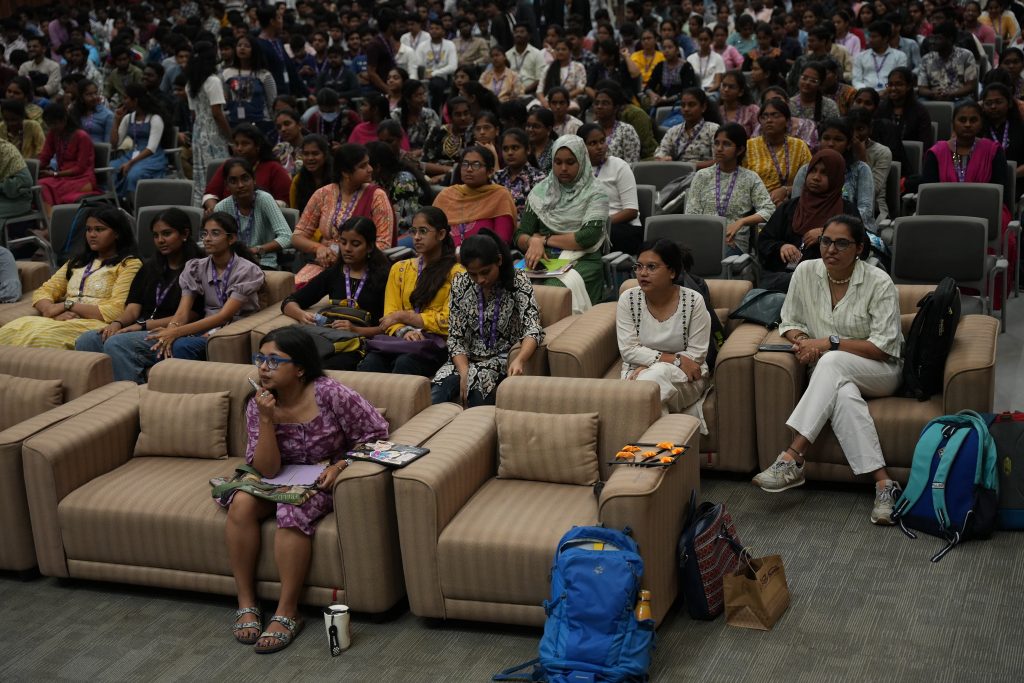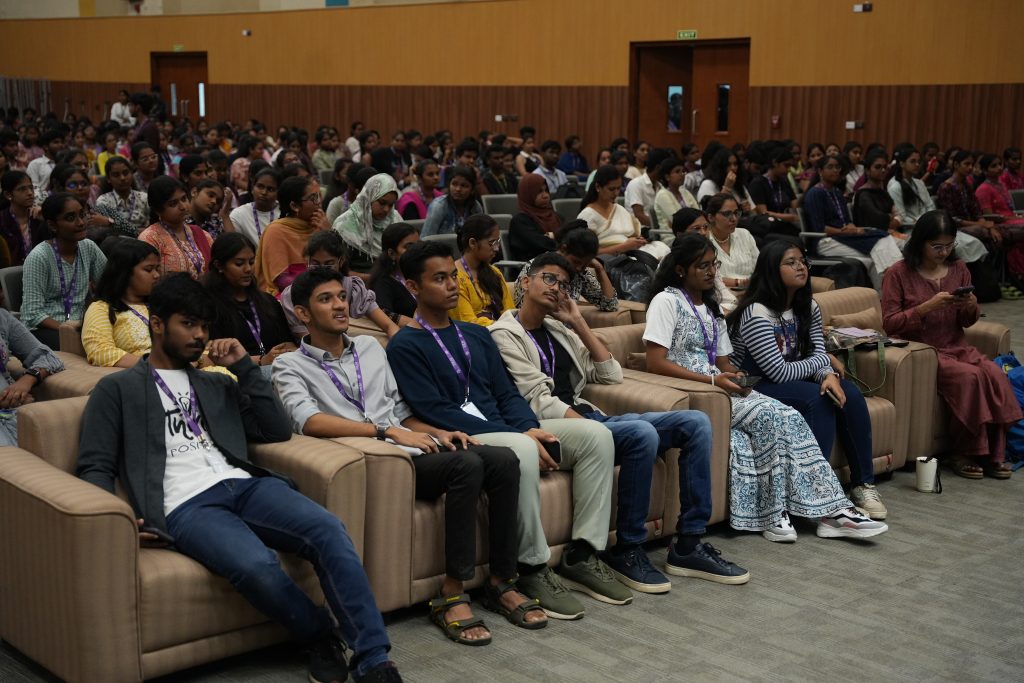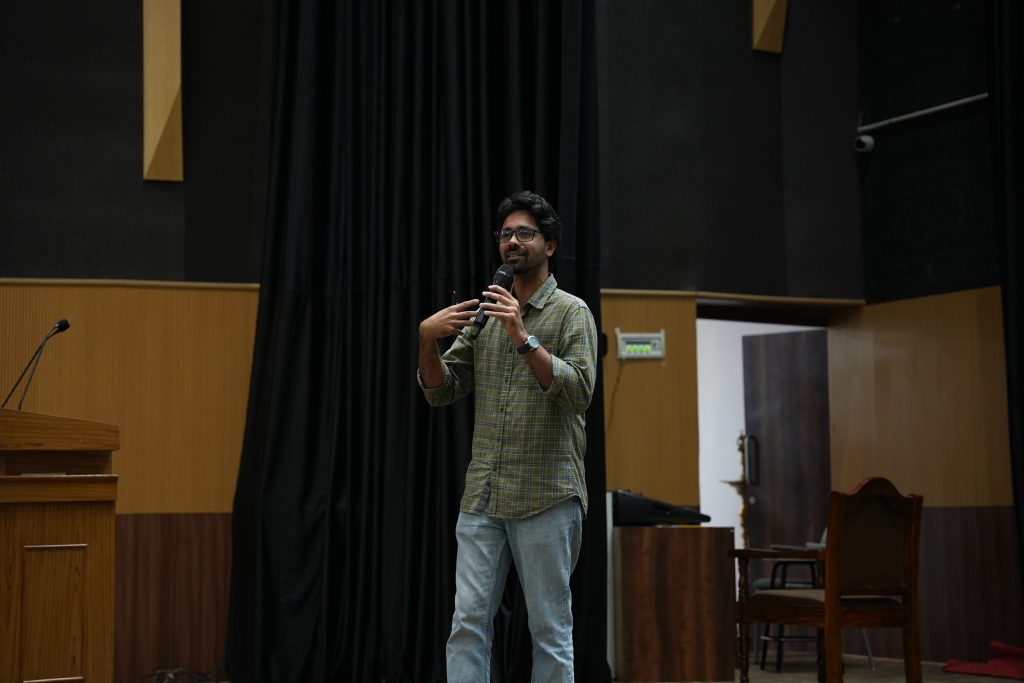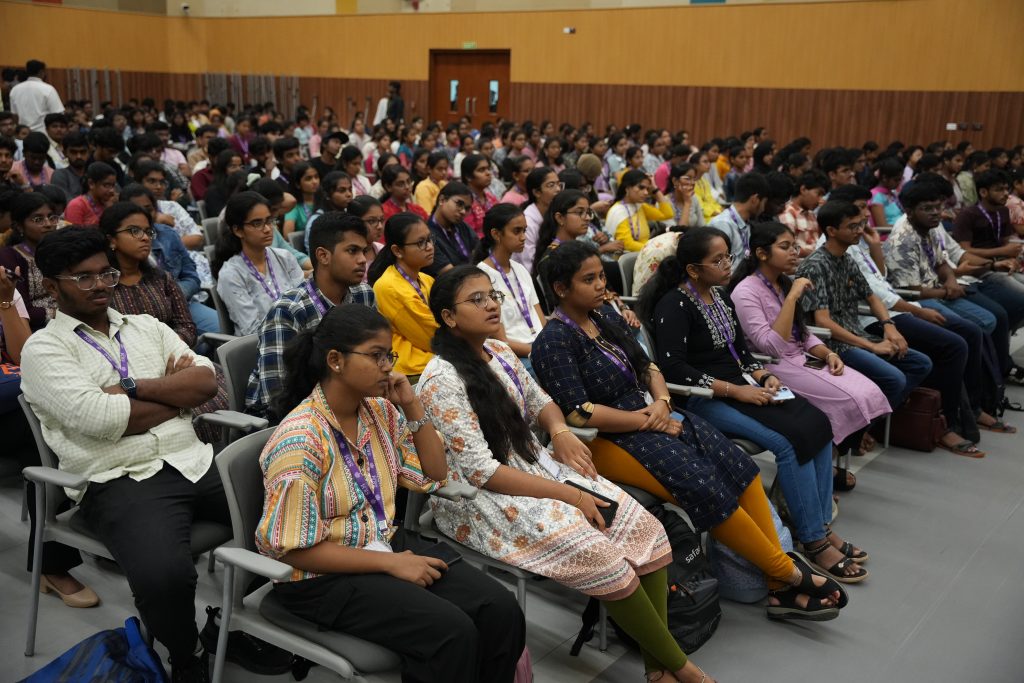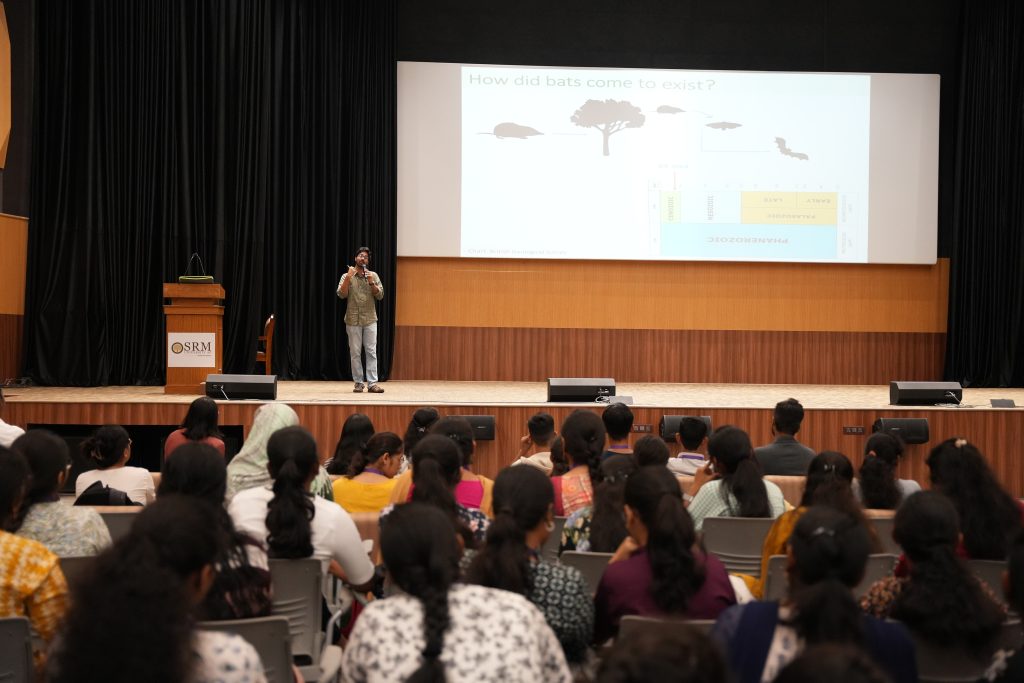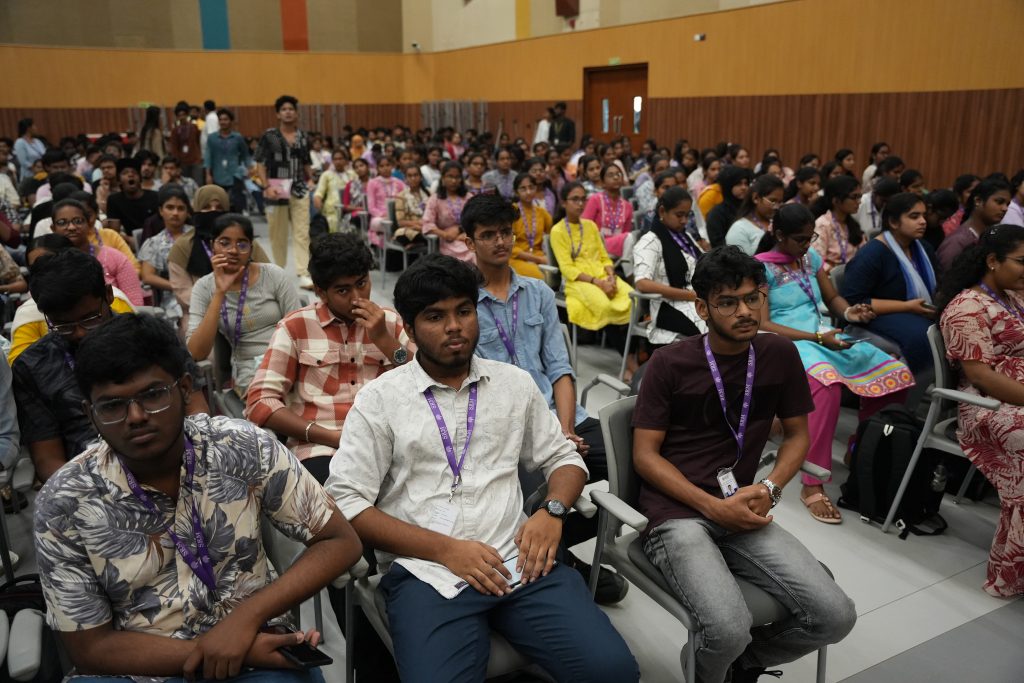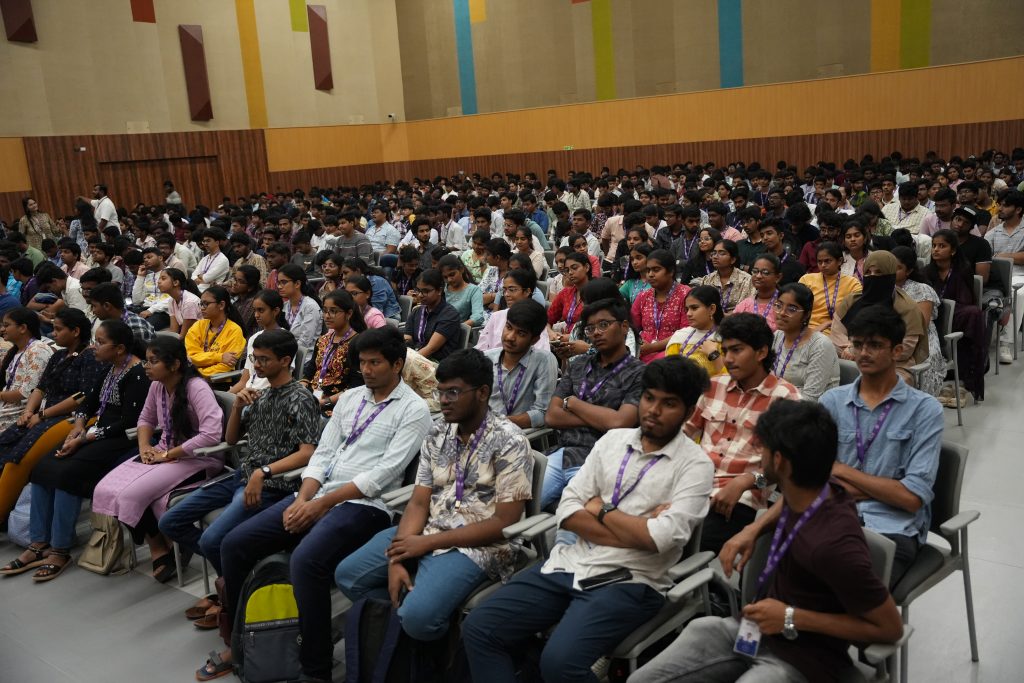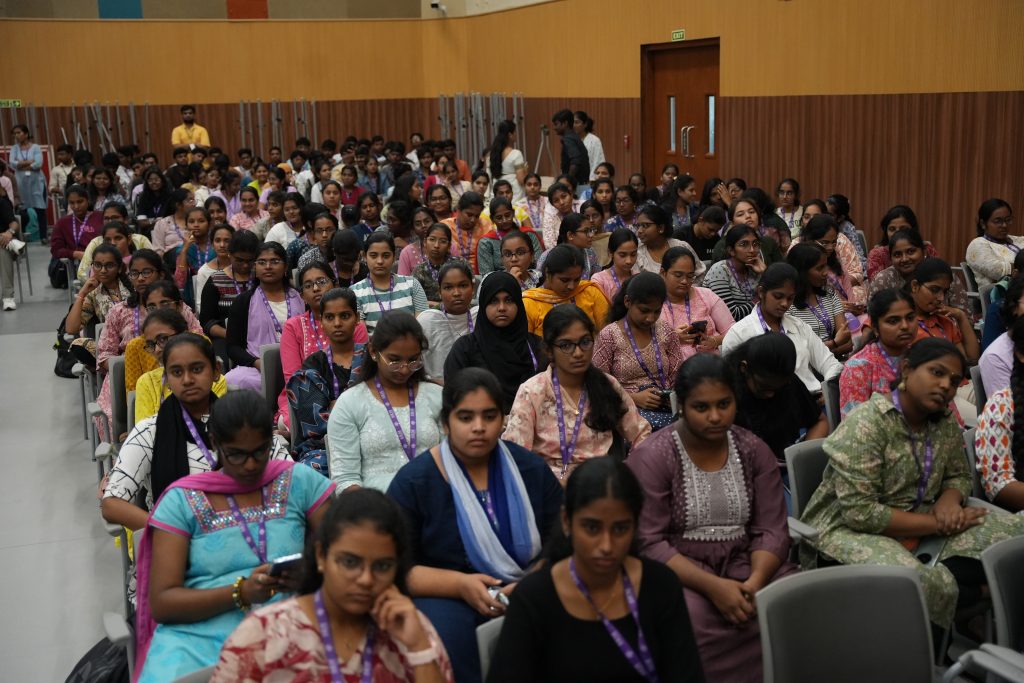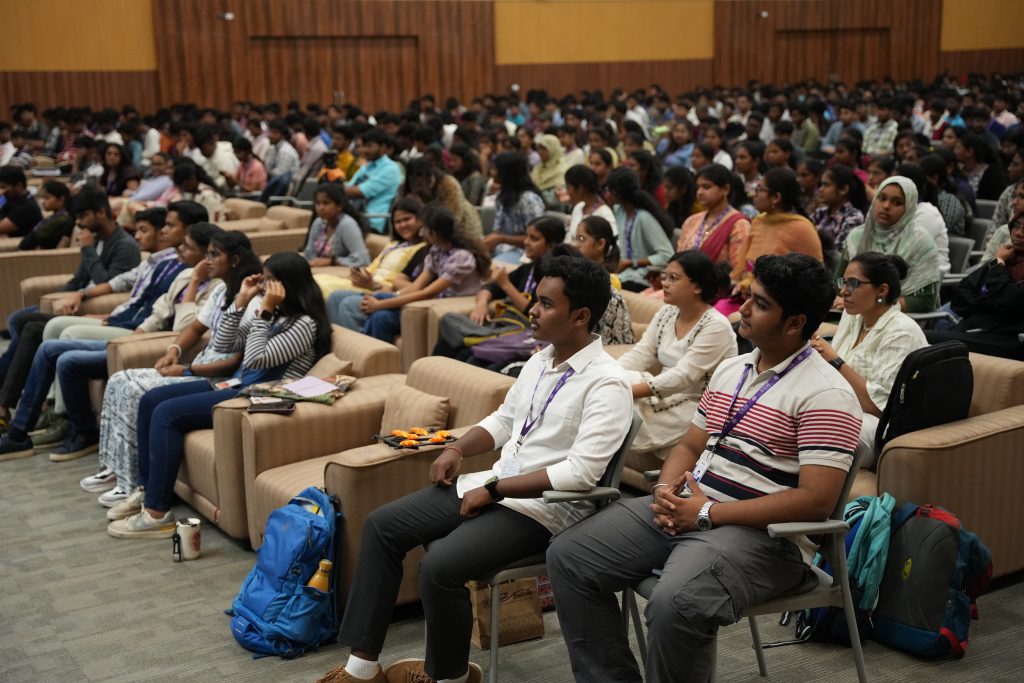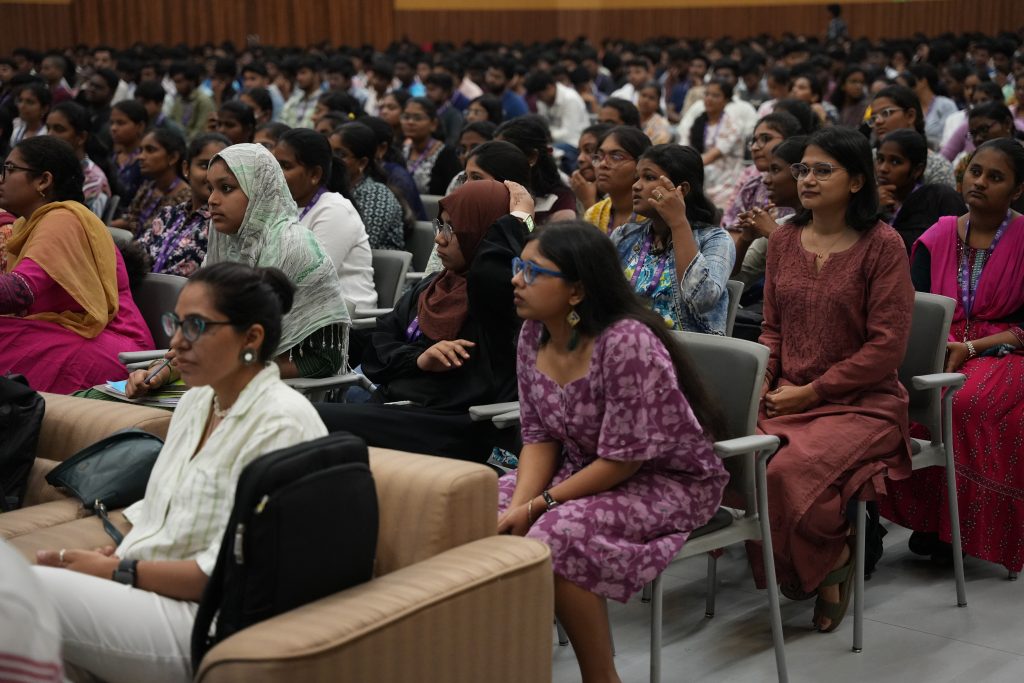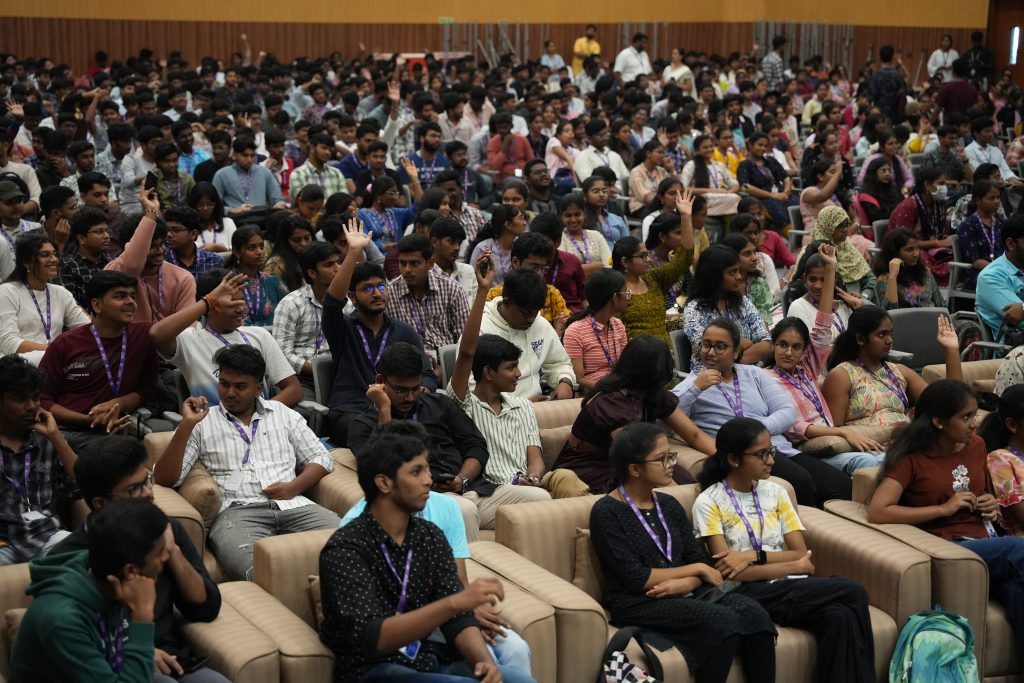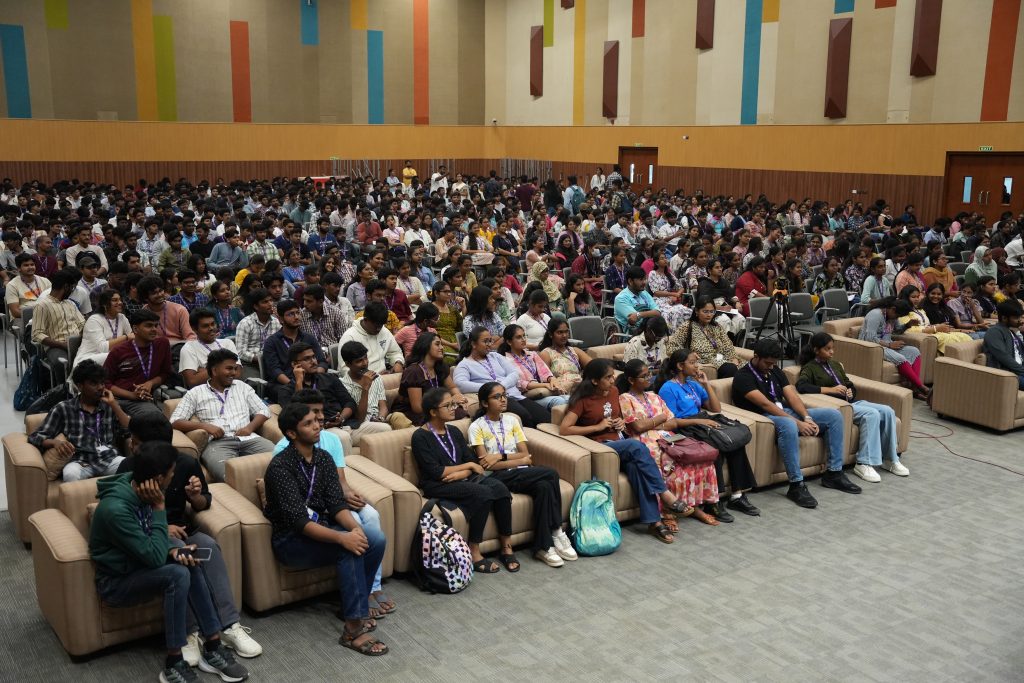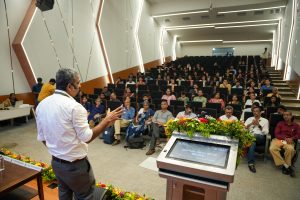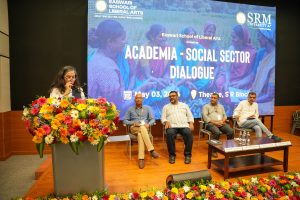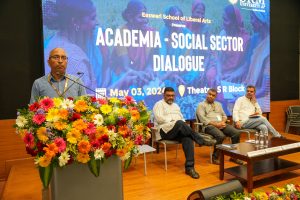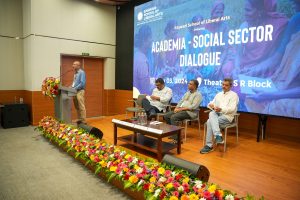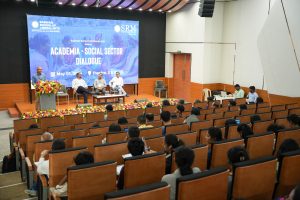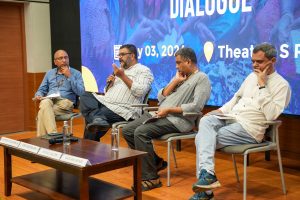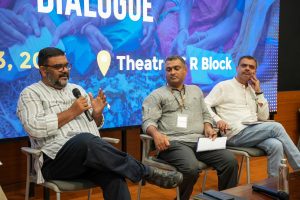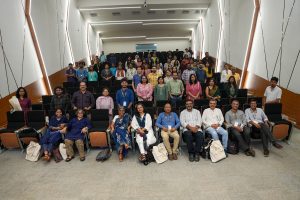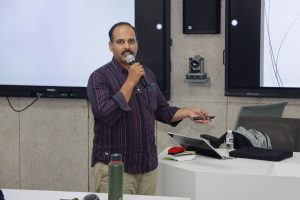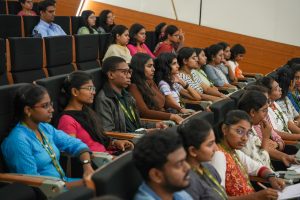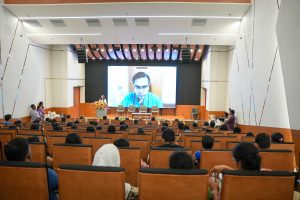A Session on Interspecies Living and Bio-acoustics by Rohit Chakravarty
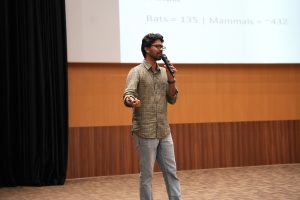
The Department of Sociology and Anthropology under the aegis of Easwari School of Liberal Arts at SRM University-AP hosted a thought-provoking session on November 07, 2024. The session unravelled a fascinating world of interspecies living and highlighted the vital yet often ignored role of bats in our ecosystem. Mr Rohit Chakravarthy, a bat researcher working with Nature Conservation Foundation and Bat Conservation International was the speaker for the session.
The session for the students of Universal Human Values and Ethics focused on inter species living and inclusivity, although misunderstood and feared, bats play a critical role in contributing to the agriculture and beverages industries. The session also revealed that bats are primary pollinators for Durian fruit and tequila, two products that owe their existence to these nocturnal creatures. The session witnessed many such interesting stories that helped to portray bats as less frightening creatures.
However, it wasn’t just science and industry on the agenda. The session brought to life the fascinating social structures within bat colonies and captivating stories of bats sharing food with those in need and even acting as midwives, assisting other bats during childbirth! These behaviours reflect values of care and community that humans can learn from—reminders of how interconnected life on Earth truly is!
The session also acknowledged their association with the deadly viruses such as SARS, COVID-19, and Nipah. As the session drew to a close, students walked away with more than just facts. They left with a renewed appreciation for the world around them.
The second session, directed at Open Elective students studying the Socio-Cultural Dimensions of Sound, dove into the incredible world of bio-acoustics. The lecture explored echolocation used by bats as an important indicator for the military infrastructure for improving sonar technology used in submarines. Students were fascinated by the intricacies of interspecies communication, as bats use sound not only for navigation but also to exchange crucial information about habitat, mating, and potential threats.
The lectures beautifully combined science, ethics, and socio-cultural insights, reflecting the Department’s mission to nurture holistic thinkers and foster interdisciplinary learning. Although unconventional, the talk seemed to open new and diverse avenues for Liberal arts students, inspiring them to walk newer and less trodden paths.
- Published in Departmental News, Liberal Arts News, News
Examining Karnataka’s Mandate for Signboards: Paper by Dr Vineeth Thomas
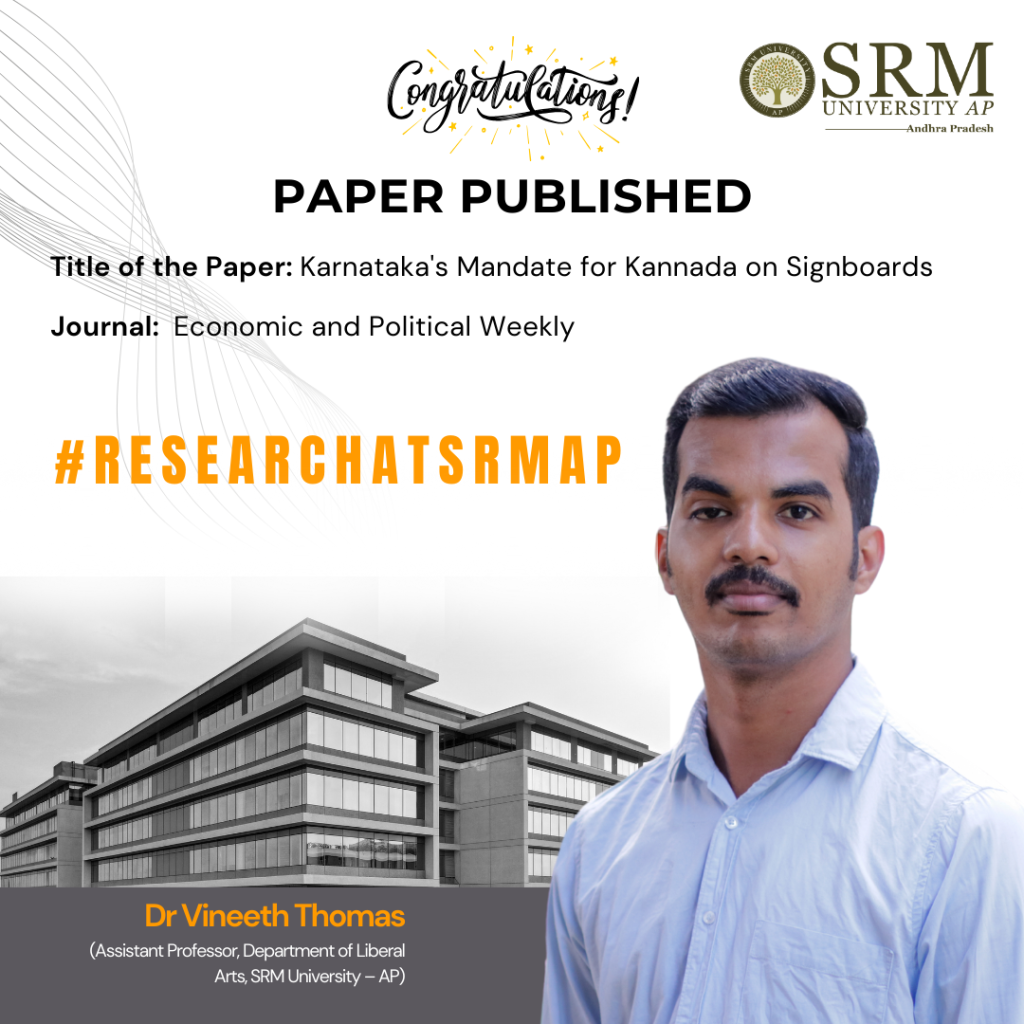
In a research paper published in Economic and Political Weekly, Dr Vineeth Thomas, an Assistant Professor at the Department of Liberal Arts, delves into the socio-political and economic implications of the “Karnataka’s Mandate for Kannada on Signboards” amendment. The article highlights the social and cultural significance of the amendment and raises awareness about the potential economic challenges it may pose. This insightful paper not only makes for an engaging read but also serves as a valuable resource for policymakers and politicians, bringing attention to the practical and social implications of the amendment.
Abstract
The Kannada Language Comprehensive Development (Amendment) Bill, 2024, ratified by the Karnataka Legislative Assembly and Legislative Council, stands as a legislative landmark with profound implications. This commentary critically analyses the socio-economic-political implications, unravelling the intricate web of influences that the Kannada Language Comprehensive Development Bill introduces within the diverse and dynamic landscape of Karnataka.
Citation
Roshmi Antony, Vineeth Thomas, Lulubala Nayak (2024)-, Karnataka’s Mandate for Kannada on Signboards, Economic and Political Weekly, ISSN (Online) – 2349-8846 (SCOPUS /ABDC Indexed)
- Published in Departmental News, Liberal Arts News, News, Research News
Easwari School of Liberal Arts Facilitates Transformative Academia-Social Sector Dialogue
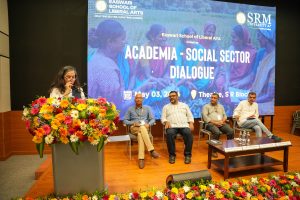 The Easwari School of Liberal Arts hosted the highly anticipated “Academia-Social Sector Dialogue” event, aiming to foster collaboration between academia and the social sector. The event brought together experts, social actors, scholars, practitioners, and students to engage in insightful discussions about the intersection of education and social sector development.
The Easwari School of Liberal Arts hosted the highly anticipated “Academia-Social Sector Dialogue” event, aiming to foster collaboration between academia and the social sector. The event brought together experts, social actors, scholars, practitioners, and students to engage in insightful discussions about the intersection of education and social sector development.
The event, convened by Prof. Vandana Swami, brought together a distinguished array of social sector leaders, Academicians from various states across India, deans, faculties, and students. It was a day of enlightening discussions and knowledge exchange, aiming to bridge the gap between academia and the social sector.
At the heart of this dialogue was a commitment to nurturing well-rounded, socially conscious leaders of tomorrow. The event provided a platform for students to engage directly with eminent figures from the social sector, fostering a deeper understanding of real-world challenges and opportunities.
The dialogue saw participation from leading social actors, including Liby Johnson (Gram Vikas, Odisha), Ronak Shah (Seva Mandir, Udaipur), Nishant Aggarwal (Donyi Polo Cultural and Charitable Trust, Arunachal Pradesh), Swapna Sarangi (Foundation for Ecological Security, Odisha), Gayatri Menon (Independent Researcher, Public Health Foundation of India, Bengaluru and Academic luminaries, such as Suraj Jacob (Azim Premji University, Bengaluru) and Manu Mathai (World Resources Institute, Bengaluru) Yamini Aiyar, Former President, Center for Policy Research, New Delhi, added depth to the dialogue, offering nuanced perspectives on the intersection of academia and the social sector.
Prof. Vishnupad, Dean of Easwari School of Liberal Arts, expressed his satisfaction with the event’s outcomes, stating, “We are delighted to have facilitated this enriching exchange between academia and the social sector. The discussions were not only insightful but also generative, paving the way for potential future collaborations between students and social sector organisations that can bring about positive change in the society.”
A highlight of the event was the keynote speech by Amitabh Behar, Global Executive Director of OXFAM. Behar’s insights sparked discussions among attendees, leading to reflection and action-oriented dialogue on caste, gender, and economic inequality. This prompted introspection and dialogue on the responsibilities of civil society in addressing these urgent issues.
The event featured thought-provoking panel discussions on two key themes: “Social Sector and the Indian State: Challenges and Opportunities” and “Role of Social Sector in Liberal Arts Education.” Panellists deliberated on the complexities and possibilities within the social sector, exploring ways to address challenges and leverage opportunities for societal progress. The dialogue was not only engaging but also fruitful, laying the groundwork for potential collaborative efforts in the future.
Furthermore, discussions on the Easwari School of Liberal Arts Summer Immersion Programme underscored the institution’s commitment to experiential learning and social impact.
Prof. Vandana Swami, Professor, Easwari School of Liberal Arts remarked, “Academia-Social Sector Dialogue epitomises SRM University-AP’s ethos of excellence, innovation, and social responsibility. It serves as a testament to the university’s unwavering dedication to shaping future leaders who are not only academically proficient but also socially conscious and empathetic global citizens”.
- Published in Departmental News, History Current Happenings, Liberal Arts News, Media Studies, News
Exploring Contemporary Narratives in New Media
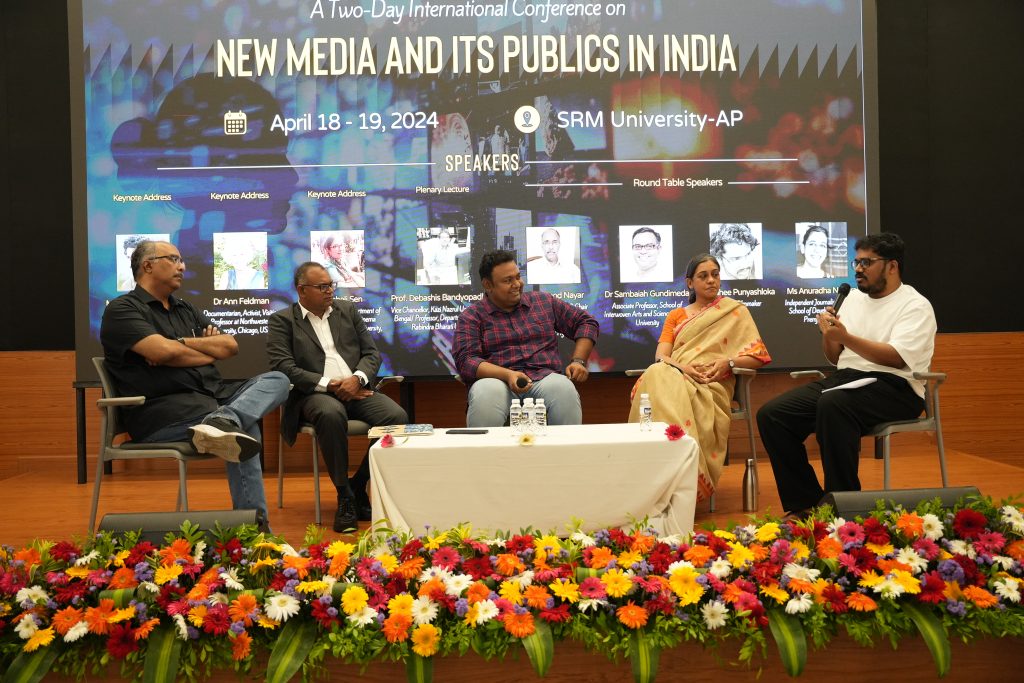
Department of Liberal Arts and the Department of Media Studies, under the aegis of the Easwari School of Liberal Arts at SRM University-AP organised its 2-day International Conference on New Media and its Publics in India. This prestigious conference welcomed renowned figures, including Mr Abhinandan Sekhri, co-founder and CEO of Newslaundry; Dr Ann Feldman, Documentarian and Activist; Dr Meheli Sen, Associate Professor, Department of AMESALL, Director of Cinema Studies Program, Rutgers University; Dr Pramod K Nayar, Professor and UNESCO Chair in Vulnerability Studies, Department of English, University of Hyderabad; Dr Sambaiah Gundimeda, Associate Professor, School of Interwoven Arts and Sciences, KREA University; Mr Rahee Punyashloka, Artist and Filmmaker and Ms Anuradha Nagaraj, Independent Journalist, Faculty at School of Development, Azim Premji University.
In his inaugural address, Vice Chancellor Prof. Manoj K Arora remarked, “We are honoured to host a conference of this magnitude. Media has become an indispensable facet of our contemporary existence; invariably, we all engage with or subscribe to media in some capacity.” Keynote speaker and co-founder of Newslaundry, Mr Abhinandan Sekhri, imparted his wisdom to the attendees, emphasising, “As the fourth pillar, media plays a pivotal role in society. It is imperative that we discern and uphold the principles of authentic journalism.” Prof. Vishnupad, Dean-Easwari School of Liberal Arts, remarked,” Technology and media have become an essential aspect of our lives today, and they have drastically altered our perception of things.”
Dr Meheli Sen, Dr Ann Feldman, Dr Pramod Nayar, Dr Sambaiah Gundimeda, Mr Rahee Punyashloka, and Ms Anuradha Nagarajan all deliberated on the various possibilities and interpretations that the New media offers and thereby shapes the public narratives. The conference also comprised a series of parallel sessions that explored the multifaceted relationship between New Media and various disciplines. Topics discussed included New Media and Literature, Gender, History, Democracy and Performance. Members of the academia presented their research papers, fostering insightful discussions on the evolving landscape of New Media.
The two-day event witnessed 150+ entries from students, scholars and faculties from across the country and the world and provided a platform for intellectual exchange but also fostered a collaborative spirit among participants. The conference concluded with a plenary address by Dr Pramod Nayar, which served as a catalyst for innovative thinking in New Media. Registrar Dr R Premkumar, in his message, applauded the efforts of the convenors, Dr Asijit Dutta and co-convenors Dr Sapna Mishra and Dr Partha Bhattacharjee for organising a scholarly colloquium such as this and remarked, “the exchange of ideas, scholarly debates, and interdisciplinary discussions that transpired here will undoubtedly enrich the academic landscape and advancement in the field of new media”.
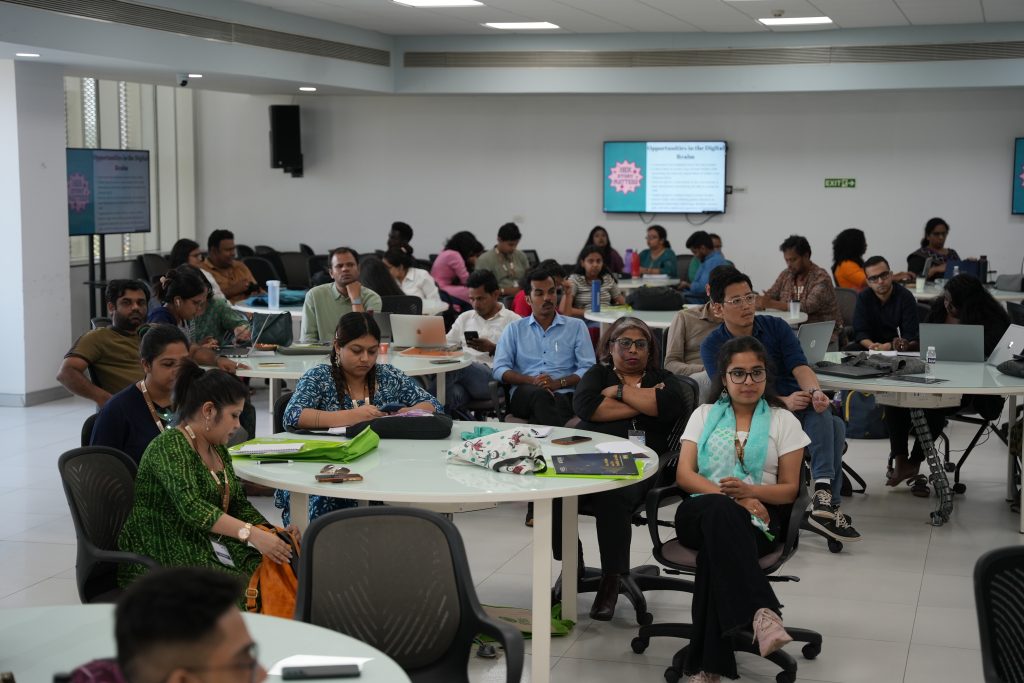
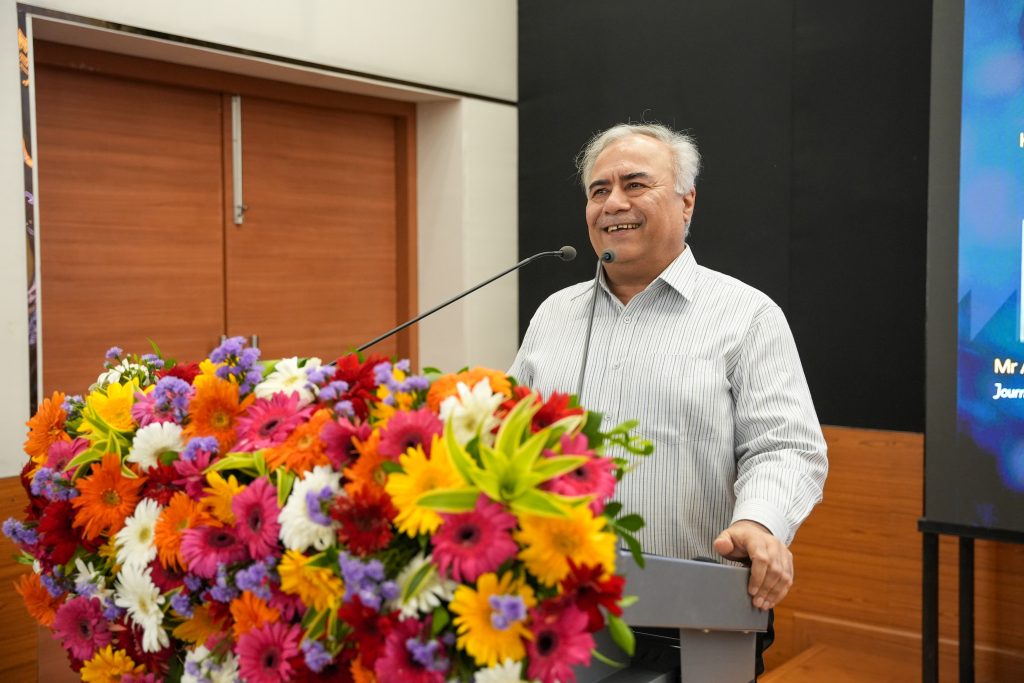
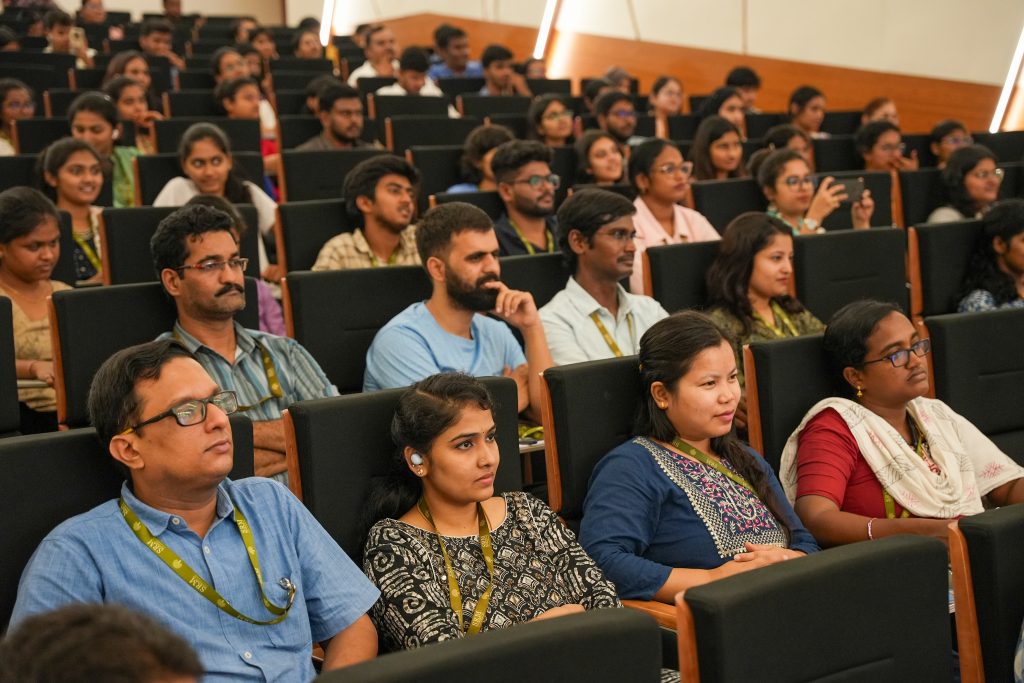
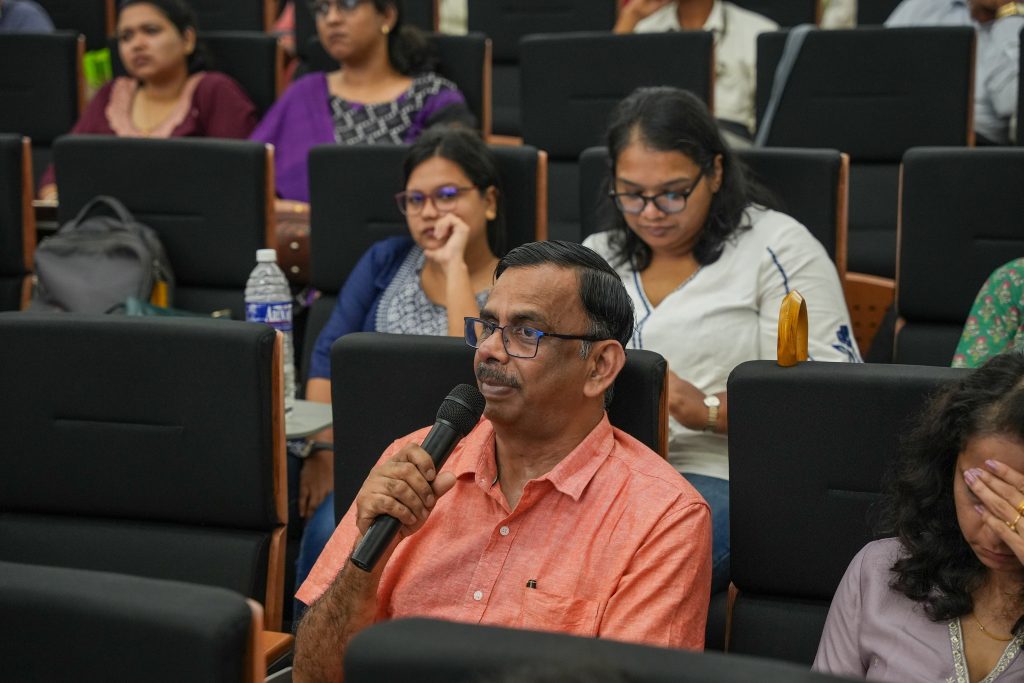
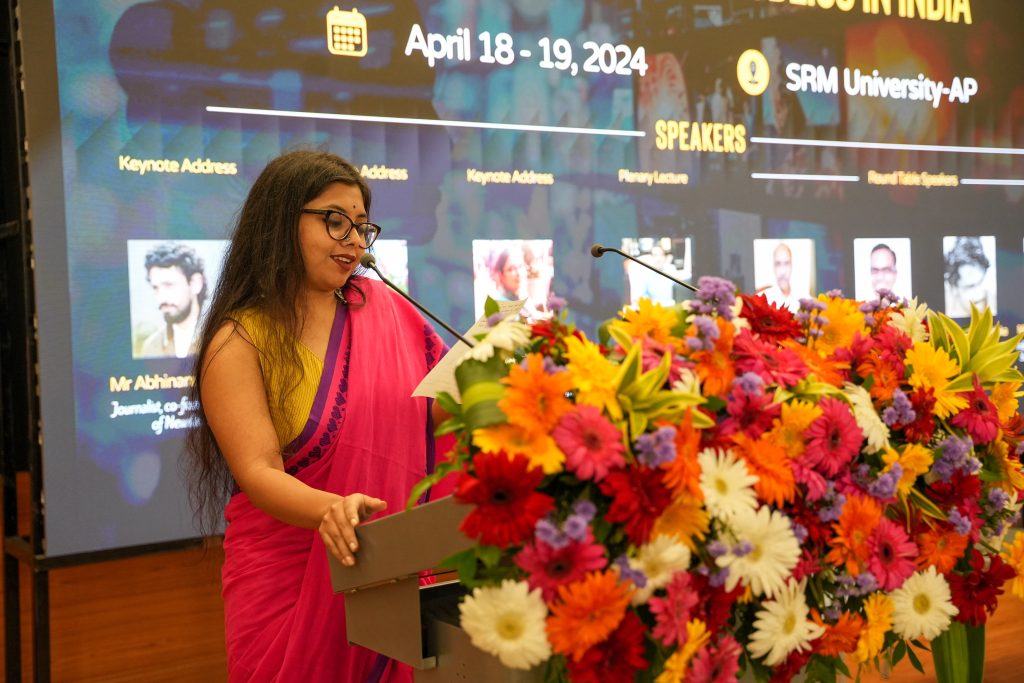
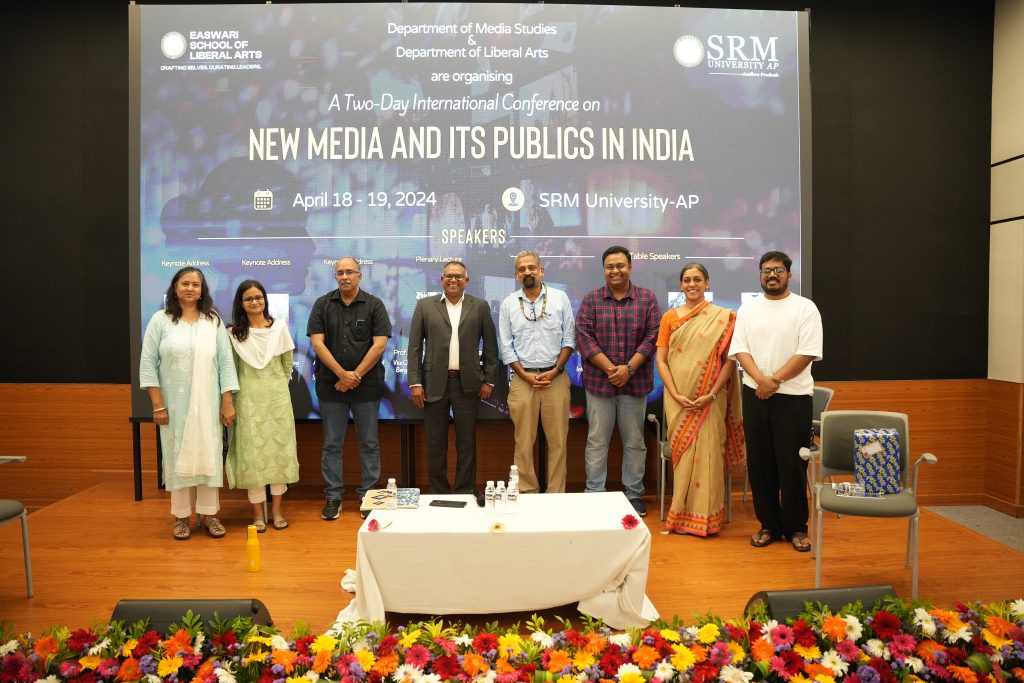
- Published in Departmental News, Liberal Arts News, Media Studies, News
Advocating for Change: Shedding Light on the Struggle of Acid Attack Survivors
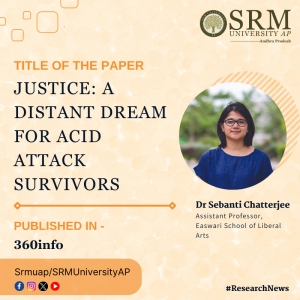 In a thought-provoking paper titled “Justice A Distant Dream for Acid Attack Survivors,” published in 360 Info, Dr Sebanti Chatterjee, Assistant Professor in the Department of Liberal Arts, delves deep into the persistent challenges faced by acid attack survivors.
In a thought-provoking paper titled “Justice A Distant Dream for Acid Attack Survivors,” published in 360 Info, Dr Sebanti Chatterjee, Assistant Professor in the Department of Liberal Arts, delves deep into the persistent challenges faced by acid attack survivors.
Despite the existence of legal provisions aimed at addressing gender-based violence, the harrowing reality is that acid attacks continue to be a stark and under-addressed form of violence. Dr Chatterjee’s paper sheds light on this critical issue, highlighting the urgent need for greater awareness, support, and legal reform to provide justice and support for survivors.
Through her research, she underscores the importance of recognising and prioritising the plight of acid attack survivors, urging for collective action to create meaningful change. As advocates for social justice, it is imperative that we amplify their voices and work towards a future where justice is not a distant dream but a tangible reality for all survivors.
Abstract
Acid attacks can occur in private or public. These attacks are often rooted in ‘jilted lover’ syndrome or as a manifestation of continued domestic violence. Few cases offer a different narrative: one woman was attacked to teach her father a lesson about property disputes. Ultimately, the acid attack is yet another demonstration of patriarchy’s brutishness.
My (unpublished) research in 2021 with acid attack survivors (including Rima), lawyers, police and other stakeholders in West Bengal — as part of a collaboration between National Human Rights Commission and National Law School of India University, Bangalore — found that despite these various legal advances, acid attack as a form of violence is not prioritised as an issue needing immediate attention, unlike rape and child trafficking.
DOI: 10.54377/e719-077c
Future Research Plan
To explore how a state cultural heritage status makes us explore the social life of an instrument- it’s secular and sacred manifestations, questions of labour, gender and the sustainability model pertinent to its musical and material interpretations.
Topic of research
Soulful beats: Ecology, Labour and Aesthetics of Ghumott
- Published in Departmental News, Liberal Arts News, News, Research News
From Vision to Reality: Assessing the Feasibility of One Nation, One Election in India
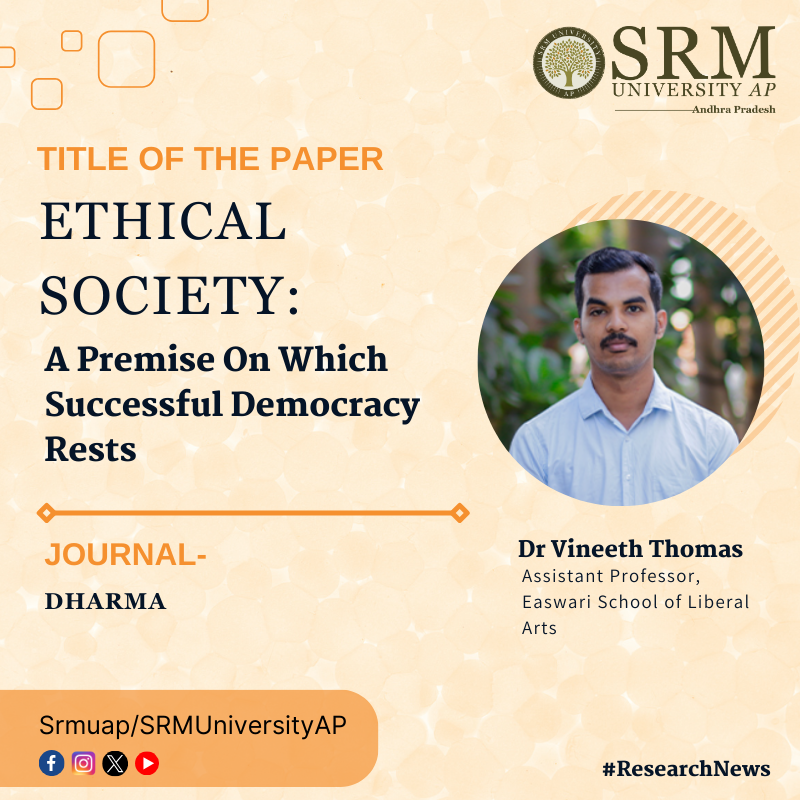
In the grand spectacle of democracy, every ballot cast represents a pivotal moment in shaping the collective destiny of a nation. However, what happens when the destiny of 1.4 billion people lacks a solid foundation of values and ethics?
Dr Vineeth Thomas, Assistant Professor at the Department of Liberal Arts, in his research paper titled “Ethical Society: A Premise On Which Successful Democracy Rests”, delves into these complexities of democratic regression that threaten to shake the foundations of our political system.
ABSTRACT:
Samuel Phillips Huntington’s thesis on the ‘Third Wave’ of democratisation, as presented in his seminal work “The Third Wave: Democratization in the Late Twentieth Century”, posited democracy as the preeminent and widely accepted form of governance. While democracy may prevail quantitatively in contemporary times, it grapples with numerous challenges in terms of its qualitative aspects. This research article identifies the absence or dearth of ethical values as a significant factor contributing to the erosion of democracies worldwide. Moreover, this erosion has the potential to incite a ‘new wave against democracy’. Consequently, this article aims to explore the potential remedy for this issue by anchoring democracy in an ethically conscious society. We contend that an ethically grounded society serves as a fundamental prerequisite for nurturing a high-quality and prosperous democracy, ultimately acting as a formidable barrier against the imminent and looming threats to democratic systems.
The link to the article
- Published in Departmental News, Liberal Arts News, News, Research News
A Scholarly Perspective on Incumbency to Dominance
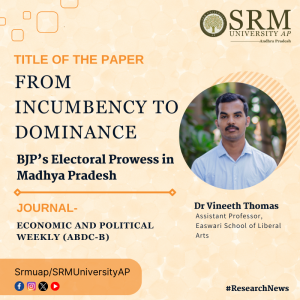 We are pleased to announce the publication of an insightful article titled “From Incumbency to Dominance: BJP’s Electoral Prowess in Madhya Pradesh,” in the prestigious ABDC-B journal, Economic and Political Weekly (EPW). This article, authored by Dr Vineeth Thomas, Assistant Professor in the Easwari School of Liberal Arts provides a comprehensive analysis of the BJP’s journey from being an incumbent party to establishing dominance in the state’s political landscape.
We are pleased to announce the publication of an insightful article titled “From Incumbency to Dominance: BJP’s Electoral Prowess in Madhya Pradesh,” in the prestigious ABDC-B journal, Economic and Political Weekly (EPW). This article, authored by Dr Vineeth Thomas, Assistant Professor in the Easwari School of Liberal Arts provides a comprehensive analysis of the BJP’s journey from being an incumbent party to establishing dominance in the state’s political landscape.
Dr Thomas examines the factors that have contributed to the BJP’s electoral success in Madhya Pradesh, including the party’s organisational strength, leadership, and strategic alliances. The article also delves into the impact of various government policies and initiatives on the BJP’s electoral performance in the state.
Dr Thomas’s expertise in political analysis and his meticulous approach to the subject matter make this article a significant contribution to the scholarly discourse on Indian politics, particularly within the context of Madhya Pradesh. This research also enriches our understanding of contemporary political landscapes and aligns with our commitment to academic excellence.
Congratulations to Dr Vineeth Thomas for this impactful contribution to political scholarship!
Abstract
In the 2023 Madhya Pradesh Assembly election, the Bharatiya Janata Party (BJP) emerged victorious with a landslide majority. This electoral triumph, characterised by a significant mandate for the BJP, has undoubtedly reshaped the political dynamics of Madhya Pradesh. The landslide victory underscores the party’s stronghold in the region and signals a decisive mandate for the BJP to govern the state for the designated term. In this context, this article analyses various strategic factors that cleared the BJP’s path from incumbency to dominance in Madhya Pradesh.
Explanation of Research in Layperson’s Terms
In the dynamic landscape of Indian politics, Madhya Pradesh stands as a crucible of electoral battles, where the ebb and flow of political tides have shaped the destiny of the state. At the heart of this electoral competition lies the Bharatiya Janata Party (BJP), an entity that has not only weathered the storm of time but has also evolved from being a political contender to establishing unwavering dominance in Madhya Pradesh.
The 2023 Madhya Pradesh Assembly election results revealed a clear mandate in favour of the BJP, securing an impressive 164 out of the total 230 seats. The overwhelming success is underscored by its triumph across different regions of the state. This comprehensive victory is particularly pronounced in the Malwa-Nimar region, which holds significant tribal populations. In this crucial area with 66 seats, the BJP secured a dominant 45 seats, leaving the Congress trailing with 20 seats, while the Bahujan Adhikar Party (BAP) clinched a lone seat. The BJP’s prowess is further evident in the Bundelkhand region, where it nearly swept the electoral landscape, securing 21 out of 26 seats, while the Congress was left with just five. Similarly, in the Vindhya region, the BJP emerged victorious in 25 out of 30 seats, leaving the Congress with a mere five. This regional dominance is a testament to the party’s strategic appeal and resonant policies. The saffron wave extended to Madhya Bharat, where the BJP outshone the Congress by winning a staggering 33 out of 36 seats (Malpani,2023). This substantial margin of victory indicates not only the party’s organisational strength but also its ability to connect with the electorate on a regional level.
So, how did the BJP complete the journey from a party in power to a political behemoth that has left an indelible mark on the state’s political canvas? A close examination in this regard unravels the fact that it is the conglomeration of clearly designed multiple tactics which gave the BJP a winning formula in the 2023 Madhya Pradesh assembly elections
Title of the Research Paper in Citation Format
Saravanan, Vineeth & Avunii, From incumbency to dominance. (2024, January 5). Economic and Political Weekly.
Practical Implementation/ Social Implications of the Research
Policy makers and politicians can make prudent decision about one nation one election
Collaborations
Electoral Politics, ethics, commonwealth
Future research plans
Indian govt and politics
- Published in Departmental News, Liberal Arts News, News, Research News
Paper Presented at the NIAS Conference in Amsterdam
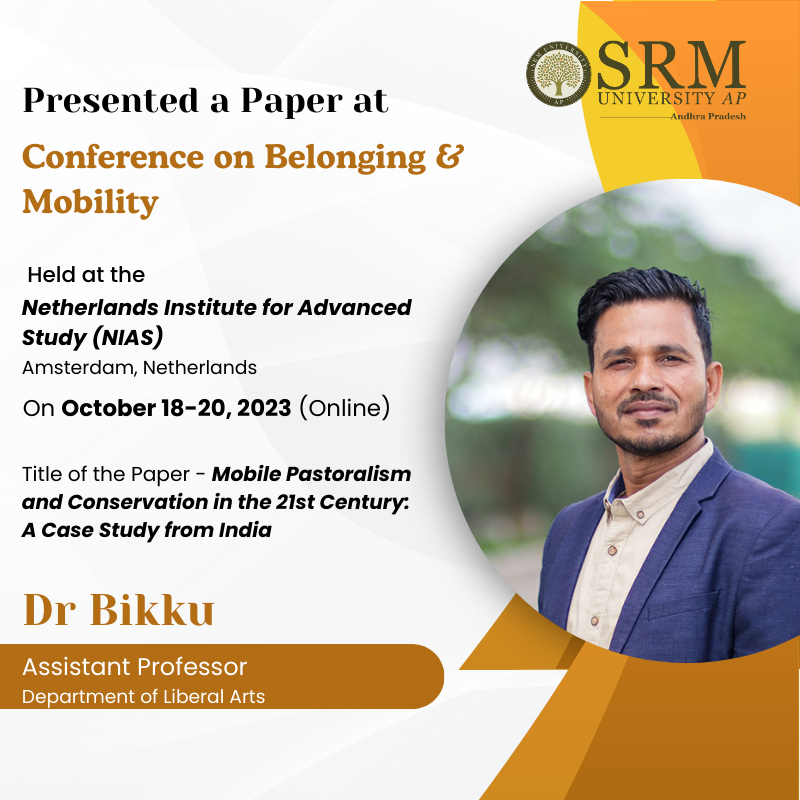
Dr Bikku, Assistant Professor, Department of Liberal Arts has presented a paper titled “Mobile Pastoralism and Conservation in the 21st Century: A Case Study from India” at the NIAS Conference on Belonging & Mobility, held at the Netherlands Institute for Advanced Study (NIAS), Amsterdam, Netherlands on October 18-20, 2023 (online).
Congratulations to Dr Bikku for this remarkable achievement. SRM AP immense pride in the success of its faculty and scholars and applauds their unwavering commitment to scientific excellence and societal impact!
Abstract
The study focuses on the struggle of nomadic pastoralists to continue their traditional occupation of raising livestock at different landscapes in the face of the shifting political ecology in India. Pastoralism is a traditional subsistence livelihood pattern that involves raising domestic animals in different pastures. For pastoralists to use continually shifting resources in a variety of ecological landscapes, mobility is an effective strategy. However, the current conservation approach has colonial roots and reinforces biodiversity conservation by establishing and enforcing protected areas in several countries around the globe. Scientific conservationists and states have often seen pastoralism responsible for environmental degradation and wildlife decline through over-grazing and resource competition, respectively. As a result, the customary rights of the various pastoralist groups have been denied inside and outside the protected areas.
The paper investigates the current global conflicts between pastoralism and conservation. It also emphasises the changing dimensions of mobile pastoralism and conservation policies in India. By challenging the conservationists’ and the state’s preconceived notions about pastoralism, the Raika mobile pastoralists of Rajasthan, India, provide sustainable pastoralism and nature conservation through evidence of the coexistence of pastoralism and multispecies.
- Published in Departmental News, Liberal Arts News, News, Research News
Exploring the Dynamics of Democracy and Foreign Policy
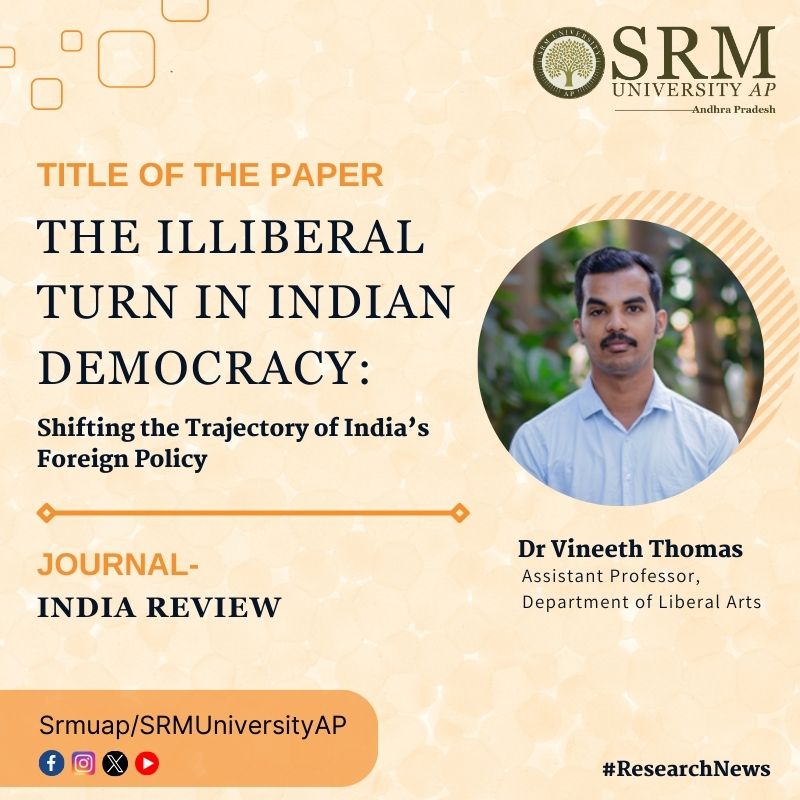
Dive into the intricate realms of Indian democracy and its ever-evolving foreign policy with a compelling research paper by Dr Vineeth Thomas, Assistant Professor, Department of Liberal Arts. The university is happy to announce the publication of Dr Thomas’ latest work, titled “The Illiberal Turn in Indian Democracy: Shifting the Trajectory of India’s Foreign Policy“, in the prestigious Q2 Journal “India Review“.
The paper is a profound exploration of the dynamic shifts in India’s foreign policy, drawing attention to the complexities of the nation’s democratic journey. His research delves into the nuanced interplay of domestic politics and global diplomacy, providing fresh perspectives on the illiberal turn in India’s democratic trajectory. The insightful work takes on a thought-provoking journey into the evolving facets of Indian democracy and the intricate interplay between domestic politics and foreign policy.
Abstract
Long-standing democracies such as India were not exempt from the global trend of democratic retreat. India has come under increasing international attention due to certain domestic policies such as the revocation of Article 370 of the Indian Constitution, the National Register of Citizens and Citizenship (Amendment) Act passed under the Bharatiya Janata Party government. In addition to India’s democratic decline being reflected in global democratic rankings, this has induced strains on India’s foreign relations. In its pursuit of becoming a leading power, India’s perceived democratic backsliding is likely to influence the direction of its foreign policy. To discern the impact of its perceived illiberal turn on its foreign engagement, the role of democracy in India’s foreign policy needs to be explored. While attempts have been made to understand democratic backsliding through a theoretical lens, the impact of a nation’s democratic status on its foreign relations and policy remains a largely unexplored area.
This study will help to understand how India’s democratic backsliding can induce a shift in its foreign policy.
- Published in Departmental News, Liberal Arts News, News, Research News
Secularity Unveiled: A Critical Analysis by Prof. Vishnupad
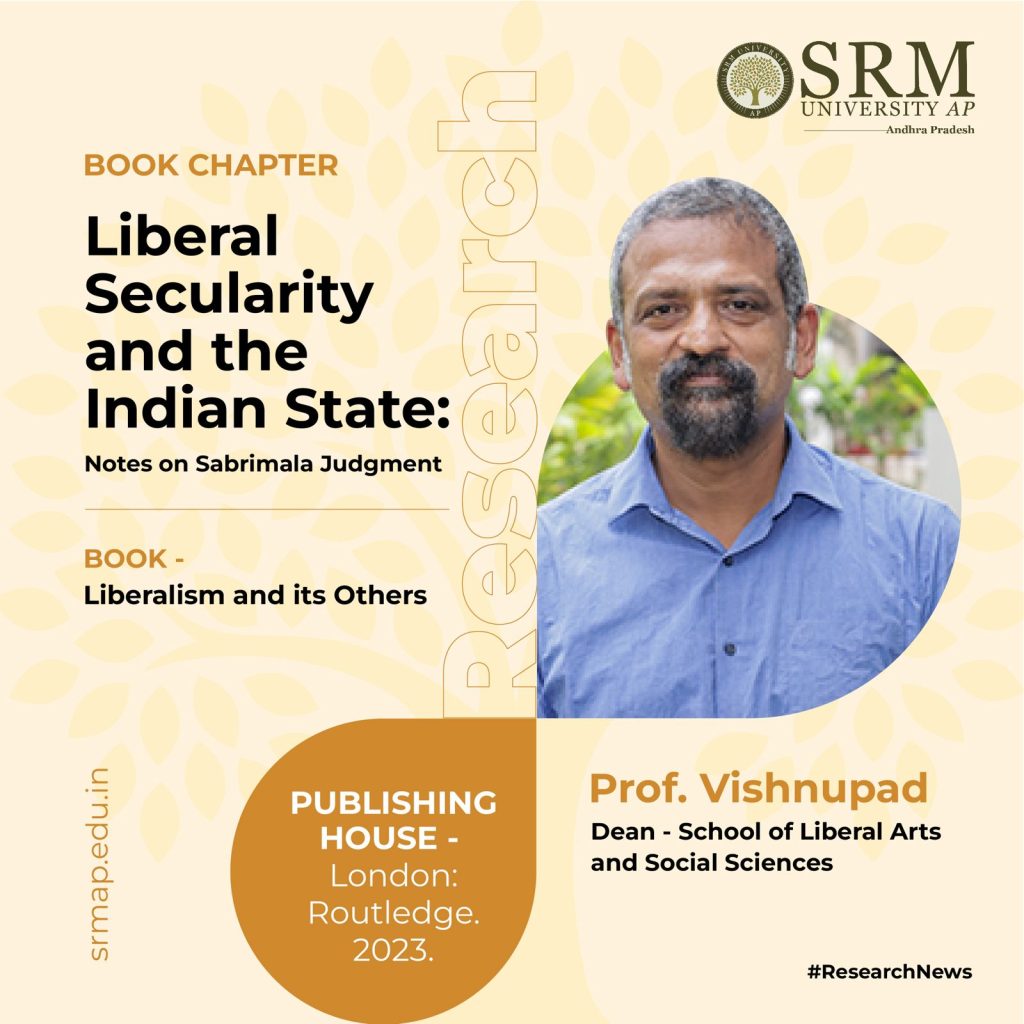
Prof. Vishnupad, Dean – Easwari School of Liberal Arts, has published his latest book chapter, “Liberal Secularity and the Indian State: Notes on the Sabrimala Judgment,” in the prestigious book “Liberalism and its Others”. The intriguing essay explores the complexities of modern secularity in liberal and postcolonial governments and navigates the delicate tango between the political and the religious. The book chapter is a scholarly investigation that maintains the importance of politics over religion while addressing the intricate dynamics of distance to closeness, neutrality to autonomy, and tolerance to publicity. Prof. Vishnupad challenges traditional knowledge, pushing to embrace ethical secularity’s dedication to discourse, transcending political and religious hierarchies.
This stimulating work is a light of intellectual engagement that will affect discussions in the fields of political philosophy, liberalism, and the state’s relationship with religion. Dive deep into these issues as we consider the nexus between politics and faith.
- Published in Departmental News, Liberal Arts News, News, Research News


